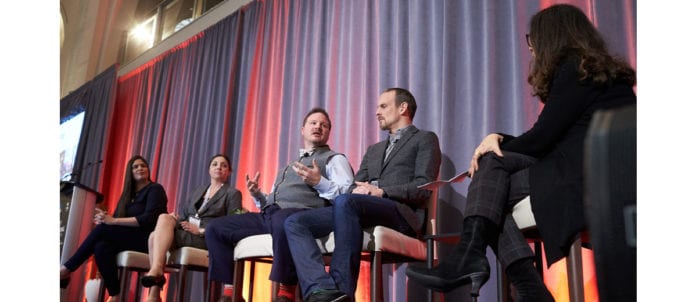TORONTO — More than 300 members of the foodservice industry gathered at Toronto’s Arcadian Court on November 5 to discuss innovation and change in the Canadian restaurant landscape. Presented by The NPD Group and CWB Franchise Finance — and sponsored by Foodservice and Hospitality magazine — the Canadian Restaurant Leadership Summit was dedicated to revealing deep insights and new opportunities for the restaurant industry.
State of the Nation
The day kicked off with the fifth-annual State of the Nation session. Robert Carter, industry expert, Foodservice, The NPD Group and Jacob Mancini, AVP, Restaurants at CWB Franchise, highlighted the most influential trends driving consumer behaviour in foodservice.
“A lot has changed over the last couple of years, particularly around the idea of innovation,” said Carter. “A lot of that’s being driven by the younger generation — the millennials and the Gen Xers — coming to the market, but even within the industry itself.”
Carter told the crowd there’s no doubt the consumer is in control in today’s foodservice market. “Today’s consumer is firmly in control of their buying behavior and their expectations are changing dramatically. So, when we look at the consumer, we have to look at the key trends — or three key emerging consumer behaviours — that are influencing the marketplace.”
Those trends, he said, include technology. “Thanks to the advent of technology — and use of our mobile devices and online — we’re always shopping,” said Carter. “That’s changing the expectation from a consumer standpoint that everything is available on demand. And that’s influencing this younger generation overall.”
Another trend, said Mancini, is social responsibility. “[Today is] unlike any other point in history [when it comes to a] desire — from a consumer and buyer perspective — to live a life that’s eco-friendly, socially responsible and sustainable and it really drives a lot of [consumer] behavior.
Health-and-wellness concerns were also highlighted, with Carter explaining how consumers are now looking at their food beyond just a function. “We’re looking at the health-and-wellness benefits and what attributes food can provide to make them feel better overall. A lot of people are actively using their food consumption to manage a number of different wellness aspects, but how they learn about health and wellness, as it relates to food, has changed over the last couple of years.”
View from the Top
The first panel of the day, Restaurant Leaders Reflect, moderated by Richard Southern, Business editor/reporter at 680 News, was a candid conversation with industry about innovation, evolution, sustainability and technology. Panelists included Darven Erickson, CEO and president, Cypress Five Star, Inc.; Juanita Dickson, president, Gusto 54 Restaurant Group; Tom Gaglardi, president, Northland Properties; and Nivera Wallani, president and GM, KFC Canada, Yum! Brands.
One of the topics that generated lively discussion was the “rise of the machines” in foodservice. From robots to wearable tech, the panelists weighed in on the impact of technology in their businesses.
“The advancements in technology in our industry are exciting,” said Dickson. “One thing we’re constantly talking about as a service industry [is that] technology’s a great thing to help efficiency, the consistency of product and quality. And, if you’re able to leverage it…you can actually redeploy the labour and ensure your teams are out there to service the guests — that’s the tricky balance we’re going to have to figure out. Technology in our industry is fantastic, but not as a replacement or an alternative to guest service.”
The New Technology Frontier
Carter took the stage again to moderate a discussion about the new frontier of technology and digital strategy. In this general session, industry leaders on the forefront of the constantly evolving technology and digital frontier shared their advice for how to use these new channels to ignite growth. Panelists included Patrick O’Donovan, VP, Group Account director, McCann Canada; David Sorger, president, Smooth Commerce; Gary Black, Chief Technology Officer, Recipe Unlimited; and Faye Pang, general manager, Uber Eats Canada.
Third-party delivery and its impact on restaurants’ bottom line was a hot topic for the panelists.
“Here’s what our restaurant partners have told us,” said Pang. “Initially, there a lot of trepidation around incrementality/profitability — how’s this going to affect our operations? What we’ve heard is this is ‘[Uber Eats] is adding incremental customers to our business.’”
Pang also said restaurants “enjoy the data and insights we provide. We have Restaurant Manager, which is an online platform any restaurateur can go into and see what the top-selling items are, whether you’re selling those, how much you have sold in the last week and customer comments.” But, she warns, operators are very much at risk of analysis paralysis.
The morning breakout sessions offered attendees the chance to choose sessions focused on either innovation, evolution or transformation.
Ignite Through Innovation
Vince Sgabellone, industry advisor, Foodservice, The NPD Group led a session on using data to unlock growth. “In a time of rising minimum wage and slow economic growth, organizations need to find paths to sustainable growth,” he said, kicking off the discussion around how harnessing the power of internal and external data to guide decisions big and small is becoming table stakes to compete — but if done right, can become a competitive advantage.
Panelists included Stephen Young, senior director, Strategy & Insights, McDonald’s Canada; Sam Pollaro, CEO, Venga; Matthew Borges, director of Insights & Category Management, Boston Pizza; and Pamela Nalewajek, vice-president, Marketing, Dairy Famers of Canada.
Ignite Through Evolution
Led by Trish Halliwell and Dimitri Mazur, senior managers, Restaurants at CWB Franchise Finance, this session on matching capital to your growth plan offered first-hand accounts from operators of their businesses’ lifecycle. Panelists included Derek Doke, CEO, FranWorks; Mustafa Yusuf, president, FLOCK rotisserie + greens; and Harry Selvarajan, associate, Waypoint Investment Partners. The industry experts discussed how to finance growth, from the start-up phase to maturity, all while not jeopardizing growth and setting up for an optimal exit.
Doke talked candidly about what it was like to start his own restaurant chain more than 20 years ago. “When you don’t have capital — and you don’t have access to capital when you’re starting out — franchising seems to be the route to take. So, I raised a little bit of money through some friends and family and then went down the franchising road. Over the course of 20 years, now, I have a mixed bag of franchises, joint-venture structures and corporate stores.”
But in the beginning, said Doke, his primary source of capital was debt “and I became pretty good at borrowing money in the early parts of my life cycle.”
Ignite Through Transformation
The third breakout option, Straight Talk: The Foodservice Legal Landscape, featured partners from three top law firms in the city, who discussed some of the industry’s top-of-mind subjects, including third-party delivery, labour, franchise legal updates, franchise legal M&A considerations and cannabis legislation. Panelists included Chad Finkelstein, partner, Dale & Lessmann LLP; Larry Weinberg, partner, Cassels Brock & Blackwell LLP; and Jennifer Dolman, partner, Osler, Hoskin & Harcourt LLP.
Driving Change
Following lunch, Rosanna Caira, editor/publisher of Foodservice and Hospitality magazine, led a panel of foodservice industry leaders though a discussion of how to drive traffic through innovation and experience.
“Everybody knows how important innovation is to all of our businesses these days as we live through an age of disruption,” said Caira. “The disruption keeps happening at a faster pace and leading companies have to be a little bit more resilient, a little bit more proactive and a lot more innovative in what they do in their businesses.”
There was nothing extremely innovative in 1964 when Tim Hortons started selling coffee and doughnuts in Hamilton, Ont., said Sam Heath, head of retail, for Tim Hortons. “But the way he did it, and what he brought to the industry at the time, was a new way of doing coffee and doughnuts and providing that sort of consistency across the country.”
However, he said, 2019 was a year of innovation for the iconic chain, with the introduction of its Innovation Café and the addition of Beyond Meat to its menu.
For Thomas Heitz, corporate chef at Kraft Heinz, and his team, innovating has been more challenging. “Our customer base is so different,” he explained. “So, in the past it was all about launching a product and hoping one size fits all. With our current [foodservice] customers, innovation means something different; for every single customer we’re trying to figure out what their goal is and then honing in on how we can help them grow their business.”
For Paramount Fine Foods, Karalyn White, executive director, Corporate Affairs, said the perspective on how innovation impacts the bottom line differs. “We always need to stay true to our roots [purpose, planet, people] when we’re thinking about innovation and making sure we have exemplary food, great quality and Middle-Eastern hospitality. The biggest innovations we’ve had recently (including a commissary kitchen and a shawarma-making robot) exemplify staying true to our roots, the communities and our guests.”
Plant-based trends was another hot topic and one Christine Kuypers, vice-president, Operations & Guest Experience for Cineplex, had a great deal of insight into. A little-known fact is that that Cineplex, as an organization, sells just under $500 million in food and beverage annually.
“We do have a lot of innovation around plant-based dishes that are made honouring technique and providing a high level of satisfaction — not just substituted with something else that is for the lesser offering. We’ve had fun with it and done it in a way where it’s not to say ‘this is a health product’ — we’re meeting you where you need us to be. So, you have to be really thoughtful in where exactly you want to be in that particular [plant-based] trend and focused on making sure your decisions are aligned with the brand and the guest experience.”
An Afternoon of Learning
The insights continued into the afternoon breakout sessions, with three options available to delegates: an operational excellence quick-fire, a look at how sustainability strategies can impact the bottom line and an update on cannabis and Canadian foodservice one year after legalization.
Travis Petersen, aka The Nomad Chef, held his first pop-up cannabis dinner in April 2018. “It was going to be a one-off pop-up dinner,” he said. “I turned my house into a restaurant [and] had 164 people over four days, in groups of 12. Going into it, I assumed my clientele was going to be young 20-year-old males who use a lot of cannabis. [However,] the average age was 37 and 50-per-cent female.”
Petersen said 26 per cent of his clients were first-time cannabis users “who were intrigued and looking for this experience. So, what started as one dinner turned into three and then into a new career direction.”
According to moderator Lisa Campbell, CEO, Lifford Cannabis Solutions, the biggest challenge for restaurants across Canada, when it comes to cannabis edibles, is dealing with all the different provincial regulators, their attitudes around cannabis and cannabis education. “It’s challenging, if you’re running a national chain, to navigate those regulations for cannabis.”
“What we’re seeing in the regulatory environment is this is politically sensitive,” said Joe Kamin, Chief Revenue Officer with Lift & Co. “In some polls, as many as 50 per cent of the population still don’t really support legalization at all. So, what we’re seeing from a regulatory perspective is we’re going to do this incrementally, in small steps; sort of see how things materialize over time. As a general rule, the regulations we’re seeing across the board will start to become more malleable, but it’s going to be a period of time before that happens.”
“This is our opportunity, as Canadians, to really be the leaders of this — as other countries opt into legalization, they’re going to look to us as experts,” said Petersen. “And if we don’t give everyone the opportunity to go in and be educated, we’re going to miss this opportunity.”
Rising to the Top
The day closed with an inspiring keynote address from the “Baroness of Beer”, Manjit Minhas. The co-founder & CEO at Minhas Breweries, Distilleries and Wineries — and former Dragon’s Den star — spoke about facing tough choices with tenacity and how living up to our potential is often easier said than done.
“I’m going to talk a little bit about the lessons that I’ve learned the last two decades of being an entrepreneur,” she told the crowd. “I’m going to talk about not only the experiences I’ve had, but the lessons I’ve learned from those experiences. Because I truly believe that to be successful leaders and successful entrepreneurs, we have to learn not only from our own experiences, but from those around us.”


















